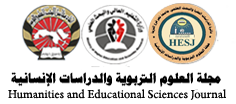دور الذكاء الاصطناعي في تنمية مهارات التفكير الناقد والاتجاهات العلمية لدى طالبات الصف الثاني الثانوي في مقرر الفيزياء
الملخص
هدفت الدراسة إلى معرفة دور الذكاء الاصطناعي في تنمية مهارات التفكير الناقد والاتجاهات العلمية لدى طالبات الصف الثاني الثانوي في مقرر الفيزياء من خلال: تحديد مهارات التفكير الناقد الواجب تنميتها لدى طالبات الصف الثاني الثانوي في مقرر الفيزياء، والتعرف على دور الذكاء الاصطناعي في تنمية التفكير الناقد والاتجاهات العلمية لديهن.
ولتحقيق أهداف الدراسة استخدمت الباحثات المنهج الوصفيّ التحليلي، وتكون مجتمع الدراسة من جميع طالبات الصف الثاني الثانوي بمدينة الرياض بالمملكة العربية السعودية. وتمثلت عينة الدراسة في (40) طالبة من طالبات القسم العلمي بالمدرسة. وتكونت أداة الدراسة من ثلاثة أدوات: اختبار التفكير الناقد، ومقياس الذكاء الاصطناعي، ومقياس الاتجاهات العلمية. وقد توصلت الدراسة إلى مجموعة من النتائج كان من أبرزها ما يلي:
- هناك أثر للذكاء الاصطناعي في تنمية التفكير الناقد ومهاراته الفرعية.
- هناك أثر للذكاء الاصطناعي في تنمية الاتجاهات العلمية.
- يوجد فرق ذي دلالة إحصائية(.05=α) بين متوسطي درجات طالبات المجموعتين الضابطة والتجريبية في التطبيق البعدي لمقياس الاتجاهات العلمية ككل ولكل مجال من مجالاته الفرعية كل على حدة لصالح المجموعة التجريبية.
- يوجد فرق ذي دلالة إحصائية (.05=α) في التطبيق البعدي بين متوسطي درجات طالبات المجموعة التجريبية وطالبات المجموعة الضابطة على اختبار التفكير الناقد ككل ولمجالاته (تفسير، تقويم الحجج، الاستنتاج) كل على حدة لصالح المجموعة التجريبية.
وفي ضوء النتائج توصلت الدراسة إلى مجموعة من التوصيات كان من أبرزها: التأكيد على تنمية مهارات التفكير الناقد ومهاراته المختلفة في المراحل الدراسية كافة، إجراء تطوير دوري للمناهج من حيث المهارات المتضمنة، وبرامج الذكاء الاصطناعي المختلفة وربط الخبرات التربوية وتكامل المعلومات بين المراحل المختلفة وعدم تجزئتها أو بنائها على شكل وحدات منفصلة غير مترابطة مع بعضها.





